Americas Sherlock Holmes
Books by William R. Hunt
Dictionary of Rogues. Philosophical Library, 1970.
North of 53: The Wild Days of the Alaska-Yukon Mining Frontier 18701914. Macmillan, 1974.
Arctic Passage: The Turbulent History of the Lands and People of the Bering Sea 16971975 . Scribners, 1975.
Alaska: A Bicentennial Histor y. Norton, 1976.
To Stand At the Pole: The Dr. Cook-Admiral Peary North Pole Controversy . Stein and Day, 1981.
Stef: A Biography of Explorer Vilhjalmur Stefansson . University of British Columbia, 1986.
Distant Justice: Policing the Alaskan Frontier . University of Oklahoma, 1987.
Body Love: The Amazing Career of Bernarr Macfadden . Bowling Green State University Popular Press, 1989.
Americas Sherlock Holmes
The Legacy of William Burns
William R. Hunt
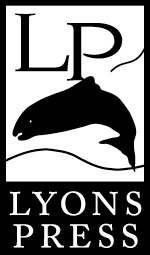
Guilford, Connecticut
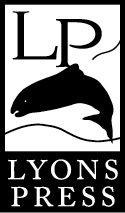
An imprint of The Rowman & Littlefield Publishing Group, Inc.
4501 Forbes Blvd., Ste. 200
Lanham, MD 20706
www.rowman.com
Distributed by NATIONAL BOOK NETWORK
Copyright 2019 The Rowman & Littlefield Publishing Group, Inc.
Foreword Copyright 2019 Jerry Clark
Americas Sherlock Holmes by William R. Hunt (formerly titled Front-Page Detective ) is published by arrangement with the University of Wisconsin Press. 1990 by the Board of Regents of the University of Wisconsin System. All rights reserved.
All rights reserved. No part of this book may be reproduced in any form or by any electronic or mechanical means, including information storage and retrieval systems, without written permission from the publisher, except by a reviewer who may quote passages in a review.
British Library Cataloguing in Publication Information available
Library of Congress Cataloging-in-Publication Data available
ISBN 978-1-4930-4031-5 (paperback)
ISBN 978-1-4930-4032-2 (e-book)
 The paper used in this publication meets the minimum requirements of American National Standard for Information SciencesPermanence of Paper for Printed Library Materials, ANSI/NISO Z39.48-1992.
The paper used in this publication meets the minimum requirements of American National Standard for Information SciencesPermanence of Paper for Printed Library Materials, ANSI/NISO Z39.48-1992.
Printed in the United States of America
To my handsome brothers: Marvin (deceased), Martin, Joe, Neil, Jim, Wallace, and Jerry
Contents
Foreword
On April 19, 1882, during a stop in St. Joseph, Missouri, on his nationwide speaking tour, Oscar Wilde reflected on the assassination, sixteen days earlier in St. Joseph, of Jesse James, the most notorious American outlaw up to that time. The Americans are certainly great hero-worshippers, and always take their heroes from the criminal classes, Wilde, exhibiting the wit of a great playwright and poet, wrote a friend. And in another letter to a different correspondent on the same day, Wilde remarked, The Americans, if not hero-worshippers, are villain-worshippers.
Wildes remarks are difficult to dispute. Jesse James is just one of many American criminalsa group that includes thieves, gangsters, and fraudsterswho have been enshrined in the culture despite their dark and desperate ways. Billy the Kid, Al Capone, John Dillinger, Bonnie and Clyde, Pretty Boy Floyd, Willie Sutton: Each, even today, is readily recognizable to historians and the general public alike. Except in a few instanceslongtime Federal Bureau of Investigation director J. Edgar Hoover, for example, or Eliot Ness, whose crime-fighting vigilance famously helped the federal government use the tax code to topple Caponemost criminals are better known in the United States than the men and women who arrested and prosecuted them. Many outlaws have been able to steal their way into the American imagination, especially after death, in ways that detectives, police officers and district attorneys have not.
William J. Burns stands out as a different character.
In his day, the American Sherlock Holmes was one of the most famous detectives in the United Statesfor reasons good and bad. He first worked for the federal government tracking down counterfeiters as a Secret Service agent, and used his skills and reputation to found the William J. Burns International Detective Agency, one of the leading organizations of its kind in the United States. Starting in 1921, as the director of the U.S. Department of Justices fledgling Bureau of Investigation, Burns established a foundation for his successor, J. Edgar Hoover, and the agency that would eventually become the towering FBI. But while he was heading the Bureau of Investigation, Burns also participated in a scheme meant to blackmail the junior United States senator from Montana, Burton K. Wheeler, who had helped spark the investigations that uncovered the Teapot Dome scandal, the worst scandal of the presidency of Warren G. Harding, which was replete with them. His deviousness revealed in the Wheeler matter and in other cases, Burns was forced to resign from the Bureau of Investigation in May 1924 at the request of Attorney General Harlan Fiske Stone, a reformer who later took a seat on the Supreme Court. Stone named Hoover, Burnss chief assistant, to take over the Bureau of Investigation, and the rehabilitation and expansion of what would become the FBI was soon underway.
Burns by now had taken on the guise of both hero and villain. He had elevated the profile of the Bureau of Investigation, but contributed to tarnishing its standing so badly that the Department of Justice was known as the Department of Easy Virtue by the time Stone forced Burns to step down. In retirement, in Florida, Burns wrote detective and mystery stories and was able to retain his reputation for Sherlockian genius, at least in the popular imagination, up until he died at age seventy, in Sarasota, on April 14, 1932. Burns as a detective was a figure in the annals of international crime equal, if not superior, in renown to his romantic compeers of fictionSherlock Holmes, M. Lecoq and Arsene Lupin, the Associated Press declared in an extensive obituary of Burns that ran in newspapers throughout the United States, including the New York Times. The paper of record, like the Associated Press, put Burnss professional triumphs alongside his ethical failings, though praise for Burns far outweighed censure. Burns was not always scrupulous or even subtle, the Times opined. But in the next paragraph, the paper wrote, Although his exploits were as glamorous as any detective-worshiping boy could wish, his success was due primarily to native shrewdness, exceptional courage, direct methods and a bluff honesty not usually associated with private detectives.
Burnss techniques and ideaswhich, when he was at the peak of his career, indeed made him more famous than any outlawhave endured, even if his name has faded with time. Burns talked about common sense and how a detective had to deceive the deceiver. Certainly no good detective would find harm in that approach. He broke down investigations into two stages, whose obviousness today can be traced largely to Burnss championing of them during his era: the detective first gathers the evidence and then confronts the culprit most likely to confess. Burns displayed all the qualities of a solid detective: rational methods, patience, and intelligence. And he possessed bravado, which only bolstered his image as a master of deductive reasoning. Solving cases, Burns said, is all quite simpleas natural as life itselfand as easily explained.
William J. Burns continues to fascinate us because he was so much like Sherlock Holmes but was a real person. Jesse James, John Dillinger, Bonnie and Clyde, and other outlaws became larger than life and, ultimately, legendary, because their exploits resembled, or were made to resemble, the deeds of Robin Hood and other crooks who became known as noble bandits. Americans came to worship these criminals because they seemed like something out of myth. Burnss near-mythical crime-solving adventures warranted him the same degree of public adoration. Burns, unlike Sherlock Holmes, did not star in fiction. He starred in real life. For that alone, he remains worthy of our consideration.
Next page
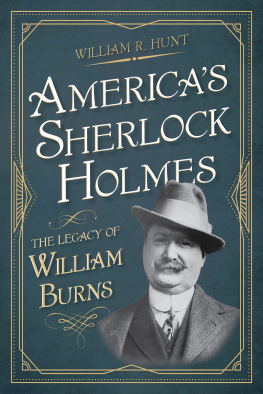

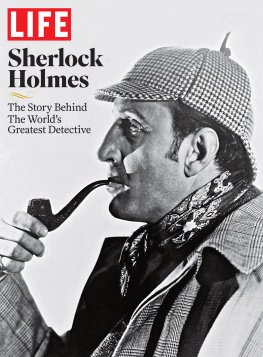
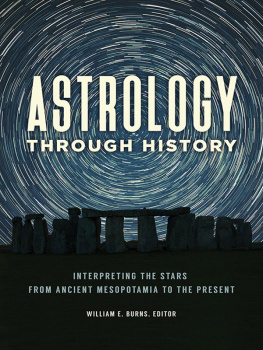
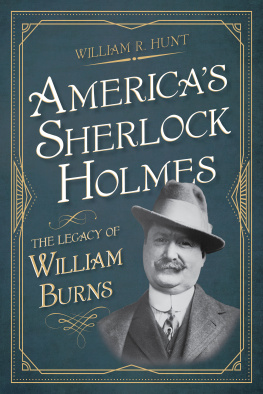


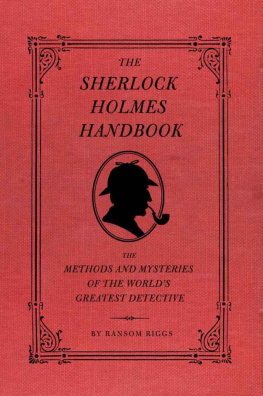

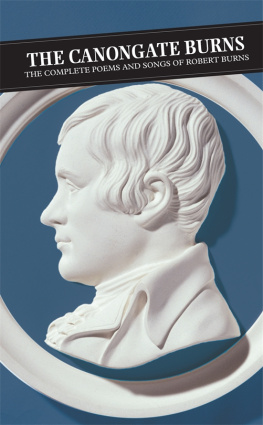

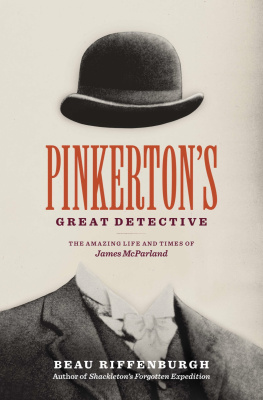


 The paper used in this publication meets the minimum requirements of American National Standard for Information SciencesPermanence of Paper for Printed Library Materials, ANSI/NISO Z39.48-1992.
The paper used in this publication meets the minimum requirements of American National Standard for Information SciencesPermanence of Paper for Printed Library Materials, ANSI/NISO Z39.48-1992.